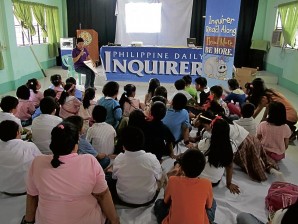
COUNCILOR Cecilia de Asis, one of the proponents of the proposed ordinance that promotes positive and nonviolent discipline of children, reads the story “Papel de Liha” during the Inquirer Read-Along session held at the ALS Center of the Department of Education in Naga City on Saturday. JOANNA LOS BAÑOS
NAGA CITY—So interactively involved, dozens of pupils reveled on stories of motherly love during a read-along session on Saturday as parents watched on the sidelines on the second floor of the Alternative Learning System (ALS) Center at Naga Central School 1 (NCS1) in Naga City.
Supporting a proposed city ordinance that aims to penalize corporal punishment of children at home and advocating “positive parenting” and discipline, the Inquirer Read-Along was the third installment of a Plan International cosponsored event after Cebu and Makati cities.
Television host Cheryl Cosim drew out snippets of home life from some 50 second graders after reading “Love You Forever,” a story of motherly love that begot the same sentiment from a son in the end.
Cosim is an award-winning host and anchor of TV and radio programs, having been in the broadcast industry for almost 14 years. She is an ambassador for the “Child Protect” country program of the Plan International Philippines.
Colorful and vivid, the prose of Robert Munsch enthralled the young listeners from NCS 1 and 2, Naga Parochial School (NPS) and University of Nueva Caceres (UNC) with the story of a mother’s journey of nurturing her child from babyhood to adulthood.
To set the mood of the story, Cosim asked the children who among them say “I love you” to their parents and vice versa.
An illustration of a mother seated in a chair rocking her new baby was projected in a tarpaulin as she introduced the story of a mother who endures a son’s individuality with unqualified love throughout the stages of his life.
“Love You Forever” tells of how love begets love, how a mother’s character shows the essence of love unknowingly to a son who passes it on to the next generation. Like the cycle of love or positive karma, the son reciprocates the love to his mother, now old and sick, by singing the same tune she had sung to him.
With melodious rhyme, Cosim involved the children in a freestyle sing-song of the lines, “I’ll love you forever, I’ll like you for always. As long as I’m living, my baby you’ll be.”
Toward the end of the story, the son sang: “I’ll love you forever, I’ll like you for always. As long as I’m living, my Mommy you’ll be.” He passed on the tune to his own child cradled in his arm.
The children chuckled at picturesque lines that described the travails of the mother understanding and loving her growing child.
Along the way, Cosim drew out their own experiences, like how they were disciplined at home. These prompted her to educate the parents on the benefits of avoiding physical punishment for children.
His voice quivering, 8-year-old Reign shared how his parents would talk to him when he committed mistakes or when he was makulit (pesky).
Enzo, also 8, said his parents would set a time limit for video games, and that punishment for infractions had made him turn his attention to reading books. “It encourages me to read more books,” he said, when asked what benefits he derived from it.
The second story, “Papel de Liha,” was read by City Councilor Cecilia “Nene” de Asis, one of the proponents of the ordinance. Written by Maria Corazon Remigio, it won the 1995 Don Carlos Palanca Memorial Award for Literature in short story for children.
De Asis has also been involved in the “Bantay Pamilya” program, a public-private initiative, which supports and assists abused children and women.
Embracing the same theme of unqualified motherly love, she engaged the children with a Filipino narrative that portrayed a dedicated mother whose hands were made rough by the household chores she was doing for the family.
Made more enjoyable with the oral reading participation of the children, De Asis asked them to read melodic words like imis-imis or lines like kiskis dito, kiskis doon, kaskas dito, kaskas doon.
A child narrated the story in the first person. After hearing an aunt named Maring that the mother’s hands were becoming rough like sandpaper, the child was to find out how soft these were when she gave comforting touch to a sick daughter.
Perhaps an allegory of the nurturing love at home, a mother’s hands indeed give life.